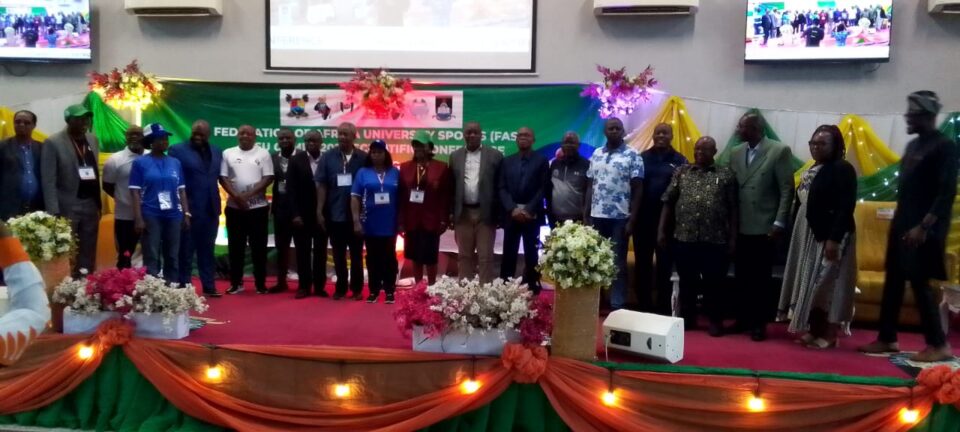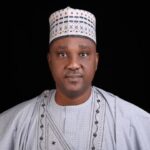From Cyriacus Nnaji, Lagos
Sports experts have advocated collaboration and artificial Intelligence among other key factors needed for Sports development in African continent.
The experts from across Africa took the stance at the 2024 Federation of Africa University Sports Scientific Conference hosted by the Lagos State University (LASU) at the Makanjuola Lecture Theatre on 25th September, 2o24.
Among issues that top discussion was the need to engage in research, localizing research, funding, and ethical issues in research and Artificial Intelligence. The experts also frowned at the practice whereby some researchers doctor researches which have been done by others.
Professor Olawale Moronkola, Director-General, National Institute for Sports (NIS) Surulere, Lagos, who anchored the panel on Sports and Research in Africa, spoke on the achievements of conference. “What we have been able to conclude is that there is need for collaboration, by the various specialists on the field of sports. We have sports psychologists, those in health Education, we have those in Exercise Physiology and then those in Sports Nutrition; and we hope the composite of their efforts will impact on the athletes.”
The erudite scholar also hinted on what should be the focus of sports researchers Africa. “And then Nigeria and Africa especially, we need to do more of multi-site studies where we don’t just stay in our institutions, we need to network and we need to share ideas. There is also the coming of AI, Artificial Intelligence that can influence our research outputs. We need to also publish in journals that are visible not only outside the country but also within the country.”
Prof. Moronkola who called for research conference dissemination, also suggested that the gown should be able to meet the town in such a way that works done in the classroom and research works should be made available to those in the field like the coaches and sports managers in simple language. “I also advocate, as a person, that our academic papers, coaches, sports managers should know them, so we should report our findings after the work, so that an average coach in Africa will understand and be able to utilise.”
He also called for more funding from the government. “We also need more funding from government and for them to give us air to breath, air to breath in the sense of the political will to support our research output and be utilised by the government and those in the industry. If we are able to do this, we will do better.”
Prof. Moronkola also spoke on the localization of research. “What we are trying to say is that we must have our own norms. That is why we require funding, most of the equipment we use, most of the norms are foreign based; if there is no funding to be able to do this, African researchers, Nigerian researchers, can do little, not only in sports, but generally in all areas of endeavors. However, with more collaboration, with TEDFUND, university grants should help us more in funding fundable research in the area of sports and health sciences that affect athletes.”
Prof Vincent Onywera, a Professor of Exercise Recreation and Sport Science from Kenyatta University, Kenya, speaking to journalists on Future of Sports and Artificial Intelligence (Changing the landscape of sports in Africa through Science and Technology) spoke on the evolution of Industrial Revolution in the world and how it affects sports in Africa. “The world is now talking about the Fourth Industrial Revolution, having moved from the First Industrial Revolution, which was largely mechanized using hydropower, and then moved to the Second Industrial revolution, when electricity came in, we saw mass production, and mechanization, then we went to the Third Industrial Revolution, the era of Computing, ICT, Automation, and we are now in the Fourth Industrial Revolution, we are seeing Artificial Intelligence, Robotics, Block Chain Technology, Big Data. All these movements have been backed up by research and Innovation, and Sports is not an exception, sports globally.”
The amiable Professor stated that there is need for Africa to uptake research to improve sports performance. “And now, more particularly in the African continent, we must uptake research to be able to improve sports performance, sports excellence, and also to be able to identify and develop talents in the continent of Africa. It is only by doing so that we would be able to compete with the rest of the world.’
Prof Onywera decried the poor performances of African athletes in the just concluded Summer Olympics in France where a country like Nigeria returned home without a medal. “Just recently we had the Summer Olympic Games, where a maximum of 32 sports disciplines were competed for, look at the US, China, Britain, Germany, they entered all the 32 sports disciplines. How about Africa? How many sports discipline for instance did Nigeria enter into? Not more than 10. How many did Kenya? Not more than 20. How many did Egypt enter, not more than 10. Why are we shying away? And yet we are all equal in the eyes of God. And yet we are very strong in other sports discipline.”
He said that Artificial Intelligence is the new normal, adding that it has come to enhance job performance and not to take people’s jobs. “We must accept that AI is the new normal, but it is not replacing the human interface, the coach, the researcher, the technical guy is very important. AI is a solution to make our work easier, make it more accurate, make data collection more accurate and communication more instant moving forward, so I want to dissuade, because I heard some people say AI has come, I am going to lose my job, no. AI has come to make our work easier.”
He commended FASU leadership for imputed AI into this year’s universities game. “FASU is currently going on, on how much AI was imputed into the game, he said, do you know here in LASU, one of the penalty shots that were awarded as based on technology, the referee has to use a form of VAR to award that penalty. And I thought that was very innovative, that was very creative.
Secondly I would not answer for FASU but I think FASU has done a tremendous job, one in using AI for accreditation and registration. I know people have challenges here and there, you see the way the accreditation was done, the communication, the aggregation of data, even the placement of the students, the sports women and women, into the various hall of residence, that is technology. You can imagine if people were to come from Kenya or Zimbabwe, then start registering on site, it would have been difficult. I think, to that extent, I congratulate the FASU leadership.



